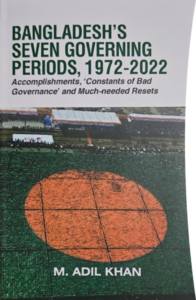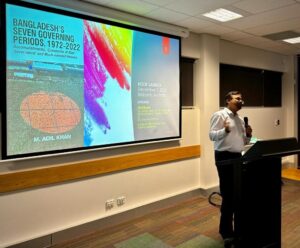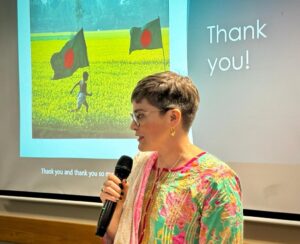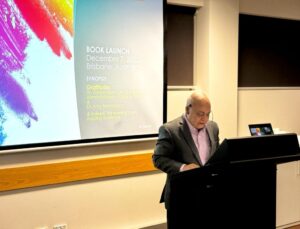
By Dr. Zaman Islam 15 December 2023
A couple of weeks ago, a Facebook post drew my attention.
Recently, Professor M. Adil Khan (more endearingly known among the Australia’s Brisbane community, as Adil Bhai), an Adjunct Professor of Development Practice at the School of Social Sciences, University of Queensland, Brisbane, Australia, and a former Senior Policy Manager of the United Nations, had posted in his Facebook page the news of publication of his latest book, “Bangladesh’s Seven Governing Periods, 1972-2022: Accomplishments, ‘Constants of Bad Governance’ and Much Needed Resets.” The book has been published by the South Asia Journal, a New Jersey (USA) based reputable on-line journal.
The title of the book
The title of the book intrigued me especially the phrase, the ‘Constants of Bad Governance.’ Moreover, I also noticed on his Facebook page where the news of publication of the book was posted, that there were wide and enthusiastic responses from many Bangladeshis and non-Bangladeshis.
In the meantime, the book was reviewed by the internationally famed journalist, Arnold Zeitlin where he commented that “Adil Khan, with a lengthy international background as a specialist in country development, has produced a handy guide to Bangladesh’s political history…”
Given the acclamations the book had already received and the curiosity it provoked, I instantly and unilaterally decided to do something to listen to the content, the story of Bangladesh from the author himself.
The Launch
When I suggested the idea of a book launch and a talk on the book from the author himself, I got a rousing endorsement from the Bangladeshi community in Brisbane and its neighborhoods.
Then I approached Professor Khan with the proposal of the Launch. Professor Khan readily agreed and more importantly, he proposed to me to invite, as Chief Guest, Dr. Amy MacMahon, a Member of Parliament of the Queensland State Assembly, and an Australia Greens Party member. More importantly, Dr. MacMahon is familiar with Bangladesh as she also happens to be Professor Khan’s former PhD student and her PhD research examined the challenges of rural women in Bangladesh in climate change conditions.
In this regard, it is important to say, that the event would have been impossible to organize without the enthusiastic response I received from the community. They paid to attend, and the event was a complete sellout.
Furthermore, the active support that I received from the community members such as Ahmad Hussein Biplob, Dr. JD Gupta and Yasmin L. Khan in organizing the event was outstanding. Without their help, the event would not have seen the light of the day.

Dr. Zaman Islam, the Convener of the Launch Event
The Launch began with the Chief Guest, Dr. Amy MacMahon uncovering (Morok Ummochon) and displaying the book to the audience. ‘Morok Ummochon’ was followed by the presentation of Professor Khan.

Dr. Amy MacMahon, MP, the Chief Guest
The Presentation: ‘One-step forward, Two-steps back’
Professor Khan began by explaining the conceptual meanings of ‘governing periods,’ ‘governance’, ‘governance characteristics’, ‘development’ and the ‘Constants of Bad Governance’ (CoBGs). Professor Khan used these concepts as the analytical framework for the book and explained how governance characteristics of the ‘seven governing periods’ impacted Bangladesh both positively as well as negatively. During his presentation, he also made a distinction between economic growth and ‘development’. He explained that economic growth is an important component of ‘development’ but not ‘development’. According to Professor Khan, ‘Development’ is a more holistic concept which means progress in equal measure in economic, social, political and more importantly, in moral nourishment.

Professor M. Adil Khan, the Author
Professor Khan narrated that during the last five decades Bangladesh has made impressive gains in economic development and advanced the country from its early seventies “basket case” to one of the thriving economies of the world. In this regard, Professor Khan also acknowledged the important contributions that Bangladesh’s NGOs such as the Grameen Bank, BRAC and Gonoshasthya Kendro had made in poverty alleviation, primary education, preventive health and in community development.
However, Professor Khan also pointed out that notwithstanding the positive accomplishments that Bangladesh has achieved during the last five decades, the ‘Constants of Bad Governance’ – the CoBGS, the repeating and accumulative democracy backslides and governance missteps, shrinking of democratic space, crony capitalism, collapsing public accountability that have made corruption an “entitlement,” restrictions on free speech and brutal repression and suppression of opposition etc. that have deepened in recent years, have dulled much of its accomplishments and worryingly, risking undoing much of the gains the country has achieved since.
Portraying a rather grim future for Bangladesh that the ever expanding and deepening CoBGs are posing to Bangladesh, Professor Khan has proposed in his book, a set of urgent resets – both immediate and incremental – as remedy and stressed that the most immediate reset is the restoration of democracy through a free, fair and a participatory election in 2024, which should pave the way to remedy the CoBGs that are deep and systemic in nature.
Summarizing the political and economic history of Bangladesh as a journey of ‘One-Step forward and Two-Steps Back” phenomenon, Professor Khan in his concluding remarks emphasized that “It is time ripe for the people of Bangladesh to break through its wrongs and journey to a society where people are treated justly and fairly …a society which is secure for all citizens… and more importantly, a Bangladesh that values, respects, protects and nurtures its sovereignty.”
A Guideline
In response to Professor Khan’s very enlightening presentation, Dr. Amy MacMahon, MP, the Chief Guest of the event observed that it is “an excellent book containing socioeconomic and political background of Bangladesh…the book could easily be the guideline for good governance in Bangladesh…”
The event ended with a Vote of Thanks from Dr. Khandakar Rahman, Cardiologist, one of the distinguished members of the Bangladeshi community in Brisbane and its neighborhoods.
For further enquiry concerning the book, please contact: info@southasiajournal.net
